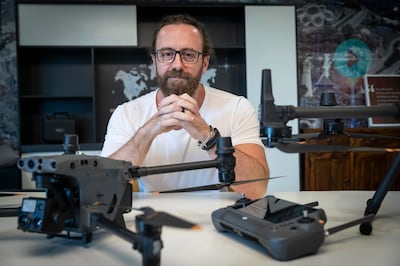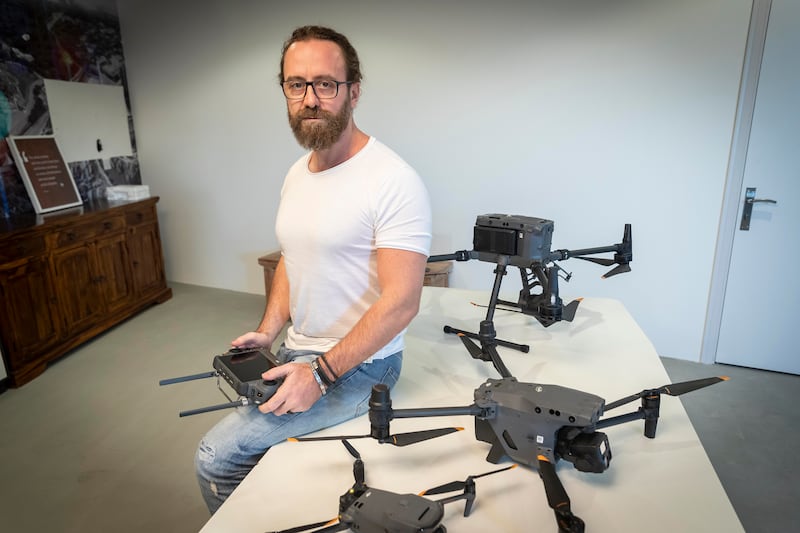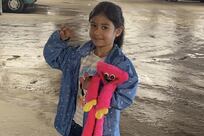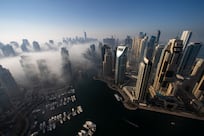Rabih Bou Rached dropped out of school but is now successfully working in the global commercial drone market as founder and chief executive of FEDS Drone-powered Solutions.
Mr Rached, 45, from Lebanon, started out in restaurants and opened his own eatery at 21 before turning to real estate and furniture manufacturing.
He moved to Dubai after a chance encounter on holiday made him realise the potential of drones, including mapping, surveying and hazardous area inspections.
He formed a team to build and fly unmanned aerial vehicles and now operates in more than 35 countries.
Mr Rached is a married with two children and lives on Jumeirah Islands in Dubai.
Did you experience wealth growing up?
I don’t come from a rich family. I don’t know if I’d call it poor, but we had enough to get by, to pay for food and school fees, necessities. My dad used to be a taxi driver at the beginning of my childhood.
I didn’t have an allowance or extra money to go to movies or on trips.
I always wanted more and imagined myself as a millionaire growing up. I didn’t want to say no to something, like if I wanted to buy that car or to be cold at night because you have to switch off the heating.
My grades weren’t bad enough to justify quitting school, but to me, you have to work to get money; there’s no way around it.
When did cash first come your way?
I was 14, a part-time job with a family friend, helping his business as a roving salesman of electrical equipment.
By 16, I would work nights as a waiter and go to school during the day. That didn’t last long because you can’t do both, and one of them would make me money, one doesn’t. At 17, it was a full-time job.
My first salary cheque was $250 a month – a lot of money for somebody that young, with all the tips.
I went to hospitality school because that looked like easy money, but I dropped out of that as well and decided no more education.
I opened my place at 21. I didn’t want to be an employee anymore.
Was that risky?
It was more of a pop-up. It didn’t cost much to convert this old house. While I enjoyed spending, and still do, I had started saving a bit.
I knew how to run the place and we made money but a few months in, I realised that food and beverage were not going to get me to where I wanted to be in life.
So I rented that place out and we started looking at other things. But I needed that experience to learn.
Why drones?
I was brand-building in Lagos, Nigeria, and wanted to come back to the Middle East, to do something else, the next big thing.
I was in Dubai on holiday and a friend asked: “Have you heard of drones?”
I realised this was what I was looking for, what the market needed, and Dubai was a no-brainer.
We officially launched in 2014 and had the first-mover advantage. We have a few hundred drones now.
Has your spending and saving changed?
Percentage-wise, it’s the same; I still spend a lot more than I save and I spend a lot more because I earn a lot more.
It cost me $1 million to start FEDS. I invested everything I had in the early years. As you evolve, it’s important to have a plan B so you don’t end up on the street.
I kept $50,000 safe in case this collapsed, something to carry on until I figured out what to do next.

Now my plan B is a lot bigger. But my risk appetite is more than the average person's.
My dabble in real estate was successful, buying and selling, initially in Dubai, in the early 2000s, and then in the US. I sold almost every property before 2007 when everything collapsed.
How do you store wealth?
In different currencies; mostly in dirhams, I moved some to dollars, pounds and euros in separate bank accounts across the world.
The bank disaster in Lebanon … could happen anywhere. I don’t feel money is safe in one currency anymore.
I also have money in stocks, invested in property in the UAE, Cyprus and Lebanon, and put money into gold.
What’s your best investment?
FEDS. We are number one, globally. It’s hard to put a value (on it) right now … we’re talking at least about $100 million. That’s a lot of gross for a $1 million investment.
Is money still a motivation?
I’ve evolved, I don’t care about money anymore.
My drive was money; being young, I did this to become a millionaire. And when you become one, you realise it means nothing – my happiness didn’t change, my lifestyle didn’t change, nothing changed in me. What changed is the drive for money is no longer there.
It’s not the cash, the bank account, it used to be a number. I wanted to own my place, and it was not going to happen unless I did “this”. So, I would save towards a goal rather than save for the sake of saving.
How do you view money?
As something to spend. It’s a means to an end. I needed to build the business, pay salaries, I needed to grow.
It’s mostly success and legacy that drives me right now, I want the FEDS name to be everywhere, to do something that has an effect.
I’m supporting people, everybody’s benefiting, people who left are starting their own businesses – this is the stuff that really makes me happy.
What is your most cherished purchase?
I was living in Jamaica and had started saving, and I got a call from my dad saying my grandad wanted me to buy a piece of land.
Now I have farmland in Lebanon, four times the size of a football field, one of the first things I bought just for me, not for work.
It’s a piece of home. When I want to relax, I fly back to Lebanon, drive two hours up the mountain and spend a weekend there.
Are you wise with money?
To me, being wise is spending it.
One of my closest friends, a cousin, was a big saver. He wanted to emigrate to Canada and died the day before he took the plane. He spent his life working towards that goal and saved every penny he ever made.
That was a huge turning point for me. I like to spend as much as I can because I believe the light could go off any minute and I don’t want to live a deprived life.
What do you enjoy spending on?
I like going out. I spend a lot on cars. I’m driving a Bentley GT, it makes me feel good.
And I’m starting to give back. There are kids in my village who can’t afford tuition, so I’ve been paying for them. They don’t know the money comes from me.
Your money being used to help somebody in need gives you more pleasure than driving the GT.






